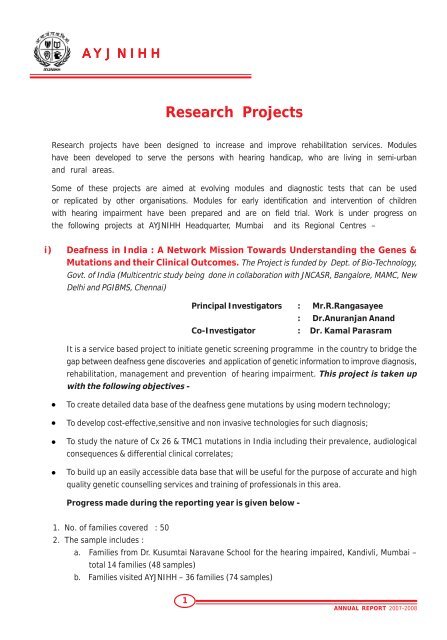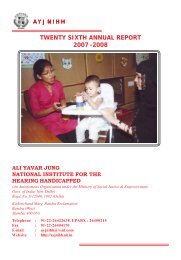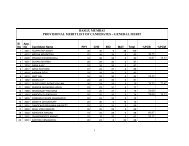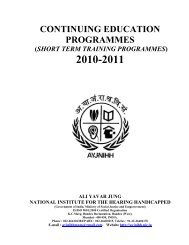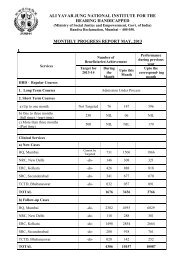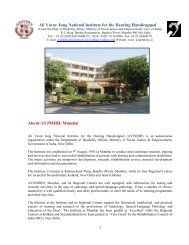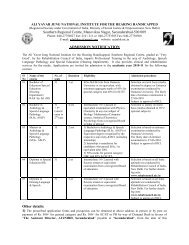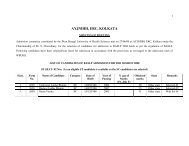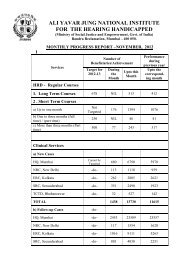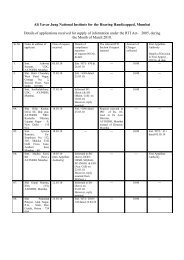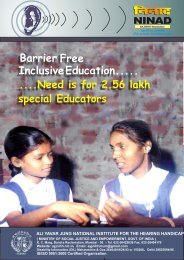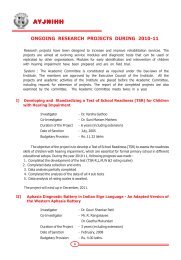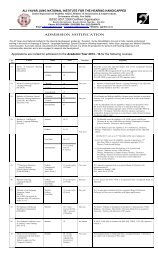Details.... - Ali Yavar Jung National Institute for the Hearing ...
Details.... - Ali Yavar Jung National Institute for the Hearing ...
Details.... - Ali Yavar Jung National Institute for the Hearing ...
You also want an ePaper? Increase the reach of your titles
YUMPU automatically turns print PDFs into web optimized ePapers that Google loves.
A YJNIHHResearch ProjectsResearch projects have been designed to increase and improve rehabilitation services. Moduleshave been developed to serve <strong>the</strong> persons with hearing handicap, who are living in semi-urbanand rural areas.Some of <strong>the</strong>se projects are aimed at evolving modules and diagnostic tests that can be usedor replicated by o<strong>the</strong>r organisations. Modules <strong>for</strong> early identification and intervention of childrenwith hearing impairment have been prepared and are on field trial. Work is under progress on<strong>the</strong> following projects at AYJNIHH Headquarter, Mumbai and its Regional Centres –i) Deafness in India : A Network Mission Towards Understanding <strong>the</strong> Genes &Mutations and <strong>the</strong>ir Clinical Outcomes. The Project is funded by Dept. of Bio-Technology,Govt. of India (Multicentric study being done in collaboration with JNCASR, Bangalore, MAMC, NewDelhi and PGIBMS, Chennai)Principal Investigators : Mr.R.Rangasayee: Dr.Anuranjan AnandCo-Investigator : Dr. Kamal ParasramIt is a service based project to initiate genetic screening programme in <strong>the</strong> country to bridge <strong>the</strong>gap between deafness gene discoveries and application of genetic in<strong>for</strong>mation to improve diagnosis,rehabilitation, management and prevention of hearing impairment. This project is taken upwith <strong>the</strong> following objectives -• To create detailed data base of <strong>the</strong> deafness gene mutations by using modern technology;• To develop cost-effective,sensitive and non invasive technologies <strong>for</strong> such diagnosis;• To study <strong>the</strong> nature of Cx 26 & TMC1 mutations in India including <strong>the</strong>ir prevalence, audiologicalconsequences & differential clinical correlates;• To build up an easily accessible data base that will be useful <strong>for</strong> <strong>the</strong> purpose of accurate and highquality genetic counselling services and training of professionals in this area.Progress made during <strong>the</strong> reporting year is given below -1. No. of families covered : 502. The sample includes :a. Families from Dr. Kusumtai Naravane School <strong>for</strong> <strong>the</strong> hearing impaired, Kandivli, Mumbai –total 14 families (48 samples)b. Families visited AYJNIHH – 36 families (74 samples)1ANNUAL REPORT 2007-2008
A YJNIHH3. Genetic Counseling session cum orientation programme <strong>for</strong> <strong>the</strong> families with Dr. Anuranjan Anand,Principal Investigator addressed and counseled <strong>the</strong>se families. The report <strong>for</strong> confirmed connexin 26mutations was received <strong>for</strong> total 24 families whose blood samples and audiological data were collected.Out of <strong>the</strong>se twenty four families, three were from Pune, three were from Indore, four were fromGujarat and rests were from Mumbai. Total 12 families reported <strong>for</strong> <strong>the</strong> counseling, eight on 24 thApril, 2007. Two families from Pune and one family from Bhavnagar attended this counseling session.Group counseling as well as individualized counseling service was offered to each of <strong>the</strong> families. Dr.Anuranjan Anand answered all possible queries asked by each of <strong>the</strong> families.4. A scientific paper titled “Implication in disclosing genetic mutations to a family – a case study”based on findings of <strong>the</strong> project was published in <strong>the</strong> International Journal of Audiology in <strong>the</strong> 46 thissue in July 2007. Computerization of <strong>the</strong> entire data till date has been completed.ii) Early Identification and Intervention towards Inclusive Education ofChildren with <strong>Hearing</strong> Impairment (0-5 years).Investigators : Mr. R.RangasayeeMrs. Saraswathi NarayanaswamyMrs. V. GathooAYJNIHH in collaboration with Balavidyalaya <strong>Institute</strong> <strong>for</strong> Teachers Training, Chennai has undertakena project titled “Early Identification and Intervention towards Inclusive Education of Children with<strong>Hearing</strong> Impairment” (0-5 years).Besides NIHH and its four regional centers, early intervention centers under <strong>the</strong> project are ongoingat <strong>National</strong> <strong>Institute</strong> of Speech and <strong>Hearing</strong>, Trivandrum; Balavidyalaya at Pondicherry, Villivakkamand Kottayam; K.L.<strong>Institute</strong> <strong>for</strong> <strong>the</strong> Deaf, Bhavnagar; Bholenath Rural Craft Development Society,Kuhibahal, Dist. Sonepur and Mai Lele Shravan Vikas Vidyalaya, Nashik. These centers all haveteachers trained under <strong>the</strong> one month orientation programme to equip rehabilitation professionals tohandle very young children with hearing impairment. A total of approximately 200 children withhearing impairment under <strong>the</strong> age of five years have received intervention services at <strong>the</strong>se centersunder <strong>the</strong> project during <strong>the</strong> reporting year, of <strong>the</strong>se 57% were in <strong>the</strong> age group of 0-3 years.iii)Development of Kit <strong>for</strong> Auditory Training <strong>for</strong> Speech titled “ Home AuditoryTraining Programme( HAP)”. The project is funded by Science & Technology Mission Mode,Ministry of Social Justice & Empowerment, Govt. of India.Principal Investigator :Mrs. Anjali KantCo-Investigator : Dr. Medha Adhyaru2ANNUAL REPORT 2007-2008
A YJNIHHThe project is taken up with <strong>the</strong> following objectives -i) To develop a kit <strong>for</strong> enabling parents and teachers to improve <strong>the</strong> auditory skills ofchildren with hearing impairment.ii) To design a kit in such a manner so as to provide easily available simple material inHindi and MarathiProgress made during <strong>the</strong> reporting year is given below -Fifteen pictures required <strong>for</strong> level three of auditory training viz. identification andsuprasegmental perception were designed. The design <strong>for</strong> <strong>the</strong> cover <strong>for</strong> <strong>the</strong> video CD inHindi <strong>for</strong> level 1, i.e. auditory awareness was finalised. The CD-ROMs <strong>for</strong> <strong>the</strong> level 1(both in Hindi & Marathi) are ready and have been field tested.iv) Development of Study Materials <strong>for</strong> B.Ed.(H.I.) Trainee TeachersPrincipal Investigator : Dr.Arun BanikCo-Investigator : Mrs.Balaka MitraConsidering <strong>the</strong> needs of <strong>the</strong> teacher of <strong>the</strong> hearing impaired, a project on ‘Development of studymaterial <strong>for</strong> B.Ed(H.I) trainees has been under taken by <strong>the</strong> Material Development Department ofAYJNIHH. To develop effective study material <strong>for</strong> <strong>the</strong>ory courses <strong>the</strong>y are to be adequately supplementedby practical experiences.To fulfil such objectives, <strong>the</strong> study materials focuses on developing in<strong>for</strong>mation and streng<strong>the</strong>ningknowledge, self-study skills and management skills in students. Under this project <strong>the</strong> departmenthas developed material in English only on four subjects during 2005-07. This four test booksdeveloped already is likely to be printed soon subject to availability of printing funds.Considering <strong>the</strong> need of such material in regional languages; it is proposed to extent <strong>the</strong> project <strong>for</strong>a period of three years with appointing of two staff on contract basis such as I) Research Assistant(M.Ed) and one DTP Operator. Initially it will be in Hindi and Marathi and later on it will extentfur<strong>the</strong>r <strong>for</strong> some o<strong>the</strong>r languages. The budget and salary of <strong>the</strong> project <strong>for</strong> three years will bebased institute project rule as adopted by <strong>the</strong> <strong>Institute</strong>. However, test books materials in English <strong>for</strong>four subjects are ready <strong>for</strong> use.3ANNUAL REPORT 2007-2008
A YJNIHHv) Screening of <strong>Hearing</strong> in Infants - A Pilot Project (SHIP)Principal Investigator : Dr. Vijayalakshmi BasavarajCo-Investigator : Ms. Aparna NandurkarDr. Ruchi NanavatiThe objective of <strong>the</strong> project is to develop and evaluate an infant hearing screening module to identifybabies with severe to profound hearing loss. And to estimate <strong>the</strong> cost and applicability of <strong>the</strong> developedmodule <strong>for</strong> India and o<strong>the</strong>r developing countries.The project is underway in collaboration with Dept. of Neonatology, K.E.M. Hospital, Mumbai. Acombination Behavioural, OAE & ABR screening techniques is being evaluated <strong>for</strong> universal hearingscreening in a Govt. Hospital set-up. Caregiver, nurse and audiologist are involved in <strong>the</strong> screening.During <strong>the</strong> reporting year 251 high-risk infants and 57 non-risk newborns were screened.vi)Developing and Standardizing a Test of School Readiness (TSR) <strong>for</strong> Childrenwith <strong>Hearing</strong> ImpairmentThe objective of <strong>the</strong> project is to develop a Test of School Readiness (TSR) to assess <strong>the</strong> readinessskills of children with hearing impairment, which are essential <strong>for</strong> <strong>for</strong>mal primary school in differentsetups. Progress made during <strong>the</strong> reporting year is given below -1. The validation of <strong>the</strong> drafted sub-tests of TSR (language, Maths, Writing, Reading) was completed.2. The Record Sheet <strong>for</strong> <strong>the</strong>se sub-tests were developed.3. All <strong>the</strong> four sub-tests of TSR were administered on children with and without hearing impairment in<strong>the</strong> age group of 5 to 7 years as a part of pilot study.4. Data collected were statistically analyzed <strong>for</strong> selecting item in <strong>the</strong> final sub-tests of TSR.5. The test-plates of all <strong>the</strong> sub-tests were sketched by <strong>the</strong> artist and <strong>the</strong> digital photographs of <strong>the</strong>setest plates were taken.6. Rating scales <strong>for</strong> accessing <strong>the</strong> Socio-Emotional Maturity and Communication Skill of Children with<strong>Hearing</strong> Impairment were developed and validated as a part of TSR.7. The finalized Test of School Readiness will be administered on Children with <strong>Hearing</strong> Impairment in<strong>the</strong> month of June as a part of standardization.4ANNUAL REPORT 2007-2008


